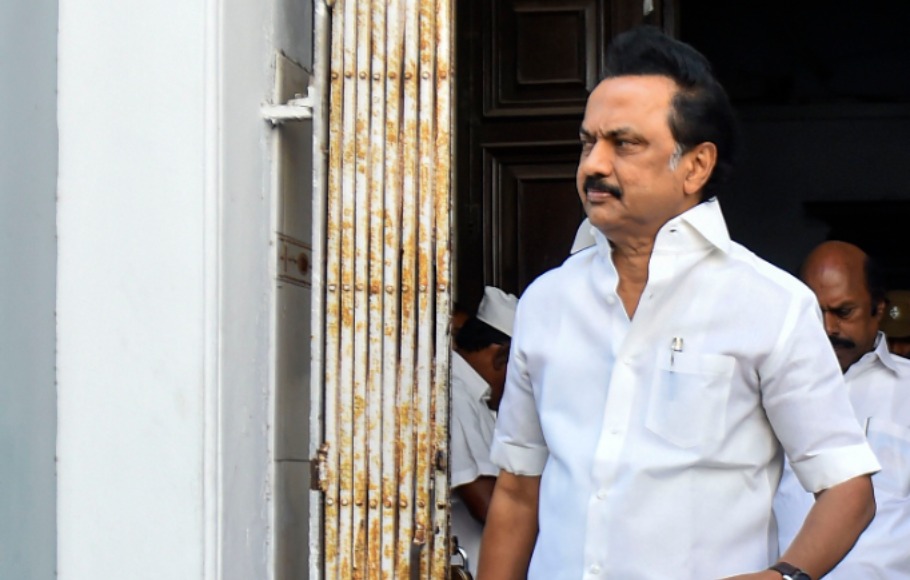
DMK's 'double standards' towards Dalits come to the fore again
The Dravida Munnetra Kazhagam (DMK), an offshoot of Dravidar Kazhagam founded by EV Ramasamy alias Periyar, seems to be adopting double standards in its commitment towards the rights of Dalits in Tamil Nadu.

The Dravida Munnetra Kazhagam (DMK), an offshoot of Dravidar Kazhagam founded by EV Ramasamy alias Periyar, seems to be adopting double standards in its commitment towards the rights of Dalits in Tamil Nadu.
While the party has been touting that its politics in the state strives for social justice, an analysis of its stand on various issues after the demise of Dravidian stalwart M Karunanidhi raises questions about its commitment to the Dalits, say political observers. The latest example is the party’s silence on the alleged discrimination against Dalit panchayat leaders, they say.
At least three Dalit panchayat leaders across Tamil Nadu have alleged discrimination against them since August 15. But, the DMK has not said anything, pointed out observers. DMK leader MK Stalin issued a statement on only one of the incidents.
The party raises voice on Dalit problems only when it suits its convenience, said political observer V Chandra Bharathi. “The DMK backed only one of the panchayat leaders from the three incidents. That was done in view of the vote bank in the particular region. In the other regions, he (Stalin) needs the votes of the intermediate castes. He, therefore, kept quiet,” Bharathi said. “Irrespective of what the DMK may claim, it is a party for the intermediate castes.”
Bharathi said the party has never been vocal about discrimination against Dalits in the state.
Many said this is just a continuation of the party’s attitude towards Dalit. The party has, for instance, been accused of not doing enough to ensure appointment of non-Brahmins, including Dalits, as priests in temples.
DMK leader and former chief minister late M Karunanidhi had promulgated an ordinance in 2006 allowing the appointment of Dalits and other non-Brahmins as priests in temples after being duly trained. Ever since the ordinance was upheld by the Supreme Court in 2015, only two of the 206 trained non-Brahmins have been appointed as priests. The DMK has hardly raised any protest, according to some of those who have received the training.
They said in 2017, when Kerala appointed non-Brahmins, including Dalits, as priests, Stalin demanded the state government should follow suit and warned of agitations if it did not. But nothing happened. “It’s been five years since the ordinance was upheld, but nothing much has happened and whatever the present-day DMK is doing is just tokenism,” said one of the Dalit priests among the 206 non-Brahmins trained by the government.
“They really don’t intend to help us. Had they cared for us and wanted us to be appointed as per the ordinance, they would have approached court. But that has not happened till now.”
Although party leader MK Stalin is working in the right direction by following the ideologies of CN Annadurai and M Karunanidhi, the DMK may also not appoint non-Brahmin priests if it comes to power, said political commentator Raveendran Duraisamy. “The DMK, too, gets some percentage of votes from the people of other castes. To safeguard that vote bank, the DMK may not show interest in appointing Dalits as priests,” he said.
It is not just the non-appointment of non-Brahmin priests, the DMK has been silent on many other matters like caste atrocities against Dalits, say political observers.
In November 2019, 13 people from an intermediate caste who were convicted for the Melavalavu massacre, in which six Dalit panchayat functionaries were killed, were released much before their sentence period got over because of good conduct. While almost all political leaders condemned the state government for their early release, the DMK evaded the issue. When The Federal visited the village in late 2019, Dalits in Melavalavu alleged that the DMK had never supported them. In fact, the massacre happened when the DMK was in power, they pointed out.
“The incident took place decades ago. We thought the DMK would stand by us at least now. But, only the Viduthalai Chiruthaigal Katchi, a party with more Dalits, has been with us ever since the massacre happened,” said Kanjivanam, a relative of one of the Dalit leaders killed.
Independent researcher Karthikeyan Damodaran also said that the party’s social justice measures were just tokenism and that they never yielded much results.
“Take the Panchami land issue, for instance. It was land meant to be given to Dalits. It was the DMK that had formed a commission to recover the Panchami land from other people to distribute it to the deserved. But, if you look at it now, there has been no progress,” said Damodaran, a writer and an independent researcher of South Asian politics. “The DMK touts its social justice measures, but they are just tokenism. The party doesn’t take any of the measures to their logical end.”
Raveendran Duraisamy, however, said that the party under the leadership of Stalin has been sticking strongly to its core ideology of social justice, as was evident in its stance on the 10% reservation for the economically weaker sections.
“The party has been vocal about the reservation policies and it has always stood by the Backward Communities, Scheduled Castes and Scheduled Tribes. Stalin, too, vehemently opposed the 10% reservation for the economically weaker sections and was keen to protect the reservation for Dalits, particularly Arundhathiyars,” he said.
Dravidian ideologue Nanjil Sampath defended Stalin saying voicing protests against every incident of caste atrocity might result in unnecessary clashes between the castes concerned.
“Moreover, actions are stronger than words and Stalin is a man of action. The allegations that he doesn’t protest against Dalit atrocities are only intended to prevent him from coming to power. But he is already way ahead of the rest in the race to the throne,” Sampath said.


